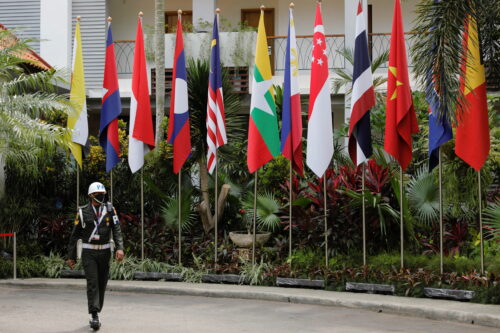This article is brought to you by Xi’an Jiaotong-Liverpool University, a leading international joint venture university based in Suzhou, Jiangsu, China.
At an all-hands meeting in 2010, Hiroshi Mikitani, the founder and CEO of Japanese online retail giant Rakuten, made a startling announcement to the company’s 10,000 employees worldwide. Speaking in English, he said that going forward, everything at Rakuten — from employee emails and team meetings to presentations and canteen menus — should be in English, even among the 7,100 Japanese staff whose first and often only language was Japanese.
At the time, the language policy, dubbed as “Englishization” by Mikitani, was met with mixed opinions. Critics questioned if Rakuten’s Japanese workers would actually obey the order and communicate with one another in their non-native tongue. But their doubts disappeared two years later when Mikitani declared the initiative a success, saying that Rakuten’s Japanese employees had shown improved English proficiency.
In the years that followed, Rakuten has been touted as a role model for multinational companies trying to mandate English as their official corporate language and a typical case of globalization studied at business schools.
However, little known to many, an American software company actually implemented a similar English-only policy in its Shanghai-based office around the same time that the transformation was underway at Rakuten. While the two initiatives shared some similarities in execution, the one in Shanghai stemmed from an America-centric thinking and was influenced by the distinct workplace culture in China, which together led to a unique outcome.
An “Englishization” initiative in Shanghai
When the American firm, which will be referred to as U-Tech in this article, opened its operation in Shanghai in 2009, teaching its Chinese workers to speak English wasn’t initially an urgent item on its priority list. But it didn’t take long for the company to change its mind.
Just months after the subsidiary Shanghai office was established, a host of internal communication problems surfaced. At the company’s headquarters in the U.S., engineers complained about the incomprehensibility of the subsidiary’s reports, emails, and Skype conversations. Meanwhile, the subsidiary staff expressed dissatisfaction with their American counterparts’ lack of consideration of their language limitations when writing or speaking.
In an attempt to reduce misunderstandings and increase efficiency at work, U-Tech decided to launch an “Englishization” initiative in 2010, which involved “language-sensitive recruitment, language policies, language training, and language-related performance appraisal mechanisms,” according to Dr. Xiaoyan Liang, a researcher at Xi’an Jiaotong-Liverpool University, who back then was hired by the company as an English trainer for the program and documented her observations in a study published in April. During her six-month stay at U-Tech Shanghai, the researcher witnessed how the company’s Englishization policies were negotiated by its employees.
“I have to switch to Chinese to fit in”
As part of its Englishization program, U-Tech Shanghai first required its workers to only speak English on Fridays, with members of its English task force being placed around the company to supervise language usage. However, within two weeks of the implementation, the management discovered that there was a significant reduction in verbal communication among its employees on English-only days, an awkward phenomenon described by the researcher as “the silence syndrome.”
Doubling down on the policy, the company later introduced a punishment mechanism, which included issuing red cards to employees caught speaking Chinese on Fridays as a warning. But in less than two weeks’ time, the mechanism had to be abandoned because it was making the workers too uncomfortable.
Little luck was found with other language initiatives at U-Tech Shanghai. Although the company offered English-language training courses to its employees, many of them found the classes too generic and not tailored to their professional needs. Some employees told the researcher that because there was no trainer assigned to correct their mistakes in real time when they spoke English, they often found themselves picking up errors from one another.
The work atmosphere at U-Tech Shanghai, where everyone tended to be conflict avoidant, appeared to be an obstacle for the Englishization strategy. In an interview with the researcher, an employee confessed that when she spoke English to her colleagues on Fridays, they either gave her a funny look or simply replied in Chinese. “So I have to switch to Chinese to fit in,” she said.
After six months, Liang left the company when her contract ended and no new policies were being implemented afterwards. It remains unknown how the Englishization turned out eventually.
Culture’s influence on the exercise of power and resistance
Drawing from her observation and 30 interviews that she conducted with engineers, support staff, and senior managers at U-Tech Shanghai, Liang and her team were “able to pinpoint the core issues at the center of the series of events that had happened,” she said, which is “power and resistance in the Chinese organization and culture.”
“We consulted literature on this topic, and located the faces of power theory by a pair of Western researchers as the theoretical basis. Consequently, our research objective was set to critique a Western power framework with contextualized research,” Liang said.
The main school of thought questioned by Liang’s study is a framework developed by Peter Fleming and Andre Spicer, who proposed a model characterized by four different power expressions, namely, coercion, manipulation, domination, and subjectification. When analyzing her findings, Liang discovered that although individual evidence of the four faces of power were readily available in her data, a closer scrutiny revealed that “often they were not discrete, thus a clear separation of which ‘face’ of power was exercised was difficult,” she said.
According to Liang, the language policies at U-Tech Shanghai could be seen as manifestations of all four faces of power being exercised simultaneously. Forcing engineers to speak English was coercion, preferring candidates with English skills in hiring was manipulation, and creating a powerful Englishizing culture with dominant discourse and incentive structures that had influence on the individual employee’s sense of identity and self-worth was both domination and subjectification, Liang said.
When it comes to resistance strategies, Liang noted that in Fleming and Spicer’s framework, “voice” entails attempts not only to block power, but also to gain access to power. However, in U-Tech Shanghai, when the employees complained about the language problem in private, their voices didn’t emerge as a resistance strategy because they didn’t unionize, negotiate with the management, or try to influence the Englishizing decisions.
Liang’s research also sheds light on the power of language in different cultural contexts. When looking at Englishization in Chinese organizations, Liang said that “it would be remiss to omit reference to the historical relationship between the two nations.” She added that because the era of China suffering continuous military defeats to Western hegemony is deeply entrenched in the collective psyche of its people, the embrace of the English language is psychologically convoluted and ideologically controversial for some Chinese workers employed by foreign firms. Meanwhile, certain preferences in Chinese culture, such as an emphasis on harmony and high collectivism, also may combine to influence the practices and dynamics during the corporate Englishization process.
Lessons for global businesses
U-Tech wasn’t the first international company to adopt English as its official language — and it won’t be the last. At a time when English is increasingly becoming the global language of business, including in China, Liang said that the in-depth analysis of the case at U-Tech Shanghai could provide a set of important managerial implications.
“First, it draws attention to the importance of cultural sensitivity in their formulation and implementation of the relevant policies when Englishizing a subsidiary in China. Subsidiary superiors ought to resort to vague language or hints rather than direct criticism to point out their subordinates’ mistakes,” she said. “Moreover, execution of language practices ought to get host country national managers on board and ensure fairness and transparency in policies and actions.”
She added: “Our study underscores the importance of distinguishing between technical and general use of English when Englishizing a subsidiary and aligning the training agenda with the specific needs of the employees. The conflation or neglect of this aspect will lead to disgruntled employees as well as reduced efficiency.”








